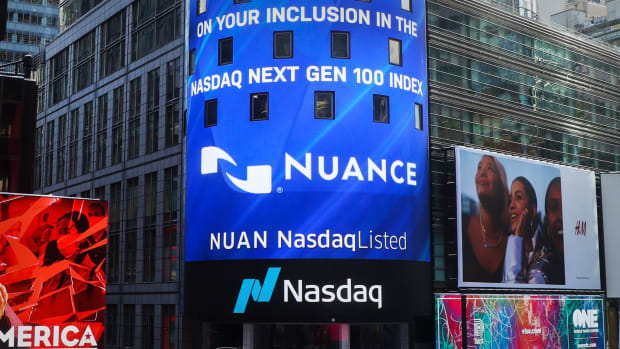American tech giant Microsoft (MSFT) has made a major push into artificial intelligence this week, closing its deal to acquire AI pioneer Nuance Communications Inc.
The buyout will cost Microsoft $19.7 billion in an all-cash deal, and the company will take all of Nuance’s net debt as part of the terms.
So why is the Seattle-based behemoth splashing out for Nuance in a volatile market and into an already-crowded sector?
The short answer is because Nuance's technology, which includes electronic health records, virtual assistance and a host of other health care simplifying tools are projected to bring Microsoft's share of the total addressable market to $500 billion.
Microsoft said in a statement that Mark Benjamin will remain chief executive of Nuance and report to Microsoft Cloud + AI group Executive Vice President Scott Guthrie.

Nuance Communications
Why AI And Why Now?
Buying Nuance as a snap-on acquisition was a no brainer for Microsoft in many ways, but the most obvious one is that Nuance's tools are already being used in about 75% of American hospitals anyway.
Microsoft said in past statements that about two-thirds of radiologists and half of doctors are already using Nuance technology, including its popular Dragon suite of AI tools.
Those encompass the Dragon Ambient eXperience, Dragon Medical One and Dragon Medical Virtual Assistant, all of which picked up enormous amounts of slack during the pandemic, when short-staffed health care facilities needed all the AI help they could get.
They Had a Preexisting Relationship
Nuance and Microsoft have already tested their ability to coexist: The two companies have had a partnership to create new and easier ways to use conversational AI.
That particular tool can be helpful for doctors who are looking for ways to see as many patients as possible, but without losing any information or missing clues to what might be ailing someone.
Microsoft said in a statement it will continue to broaden its stable of Nuance tools now that the deal has closed.
“This powerful combination will help providers offer more affordable, effective and accessible healthcare, and help organizations in every industry create more personalized and meaningful customer experiences," Guthrie said in a statement.







